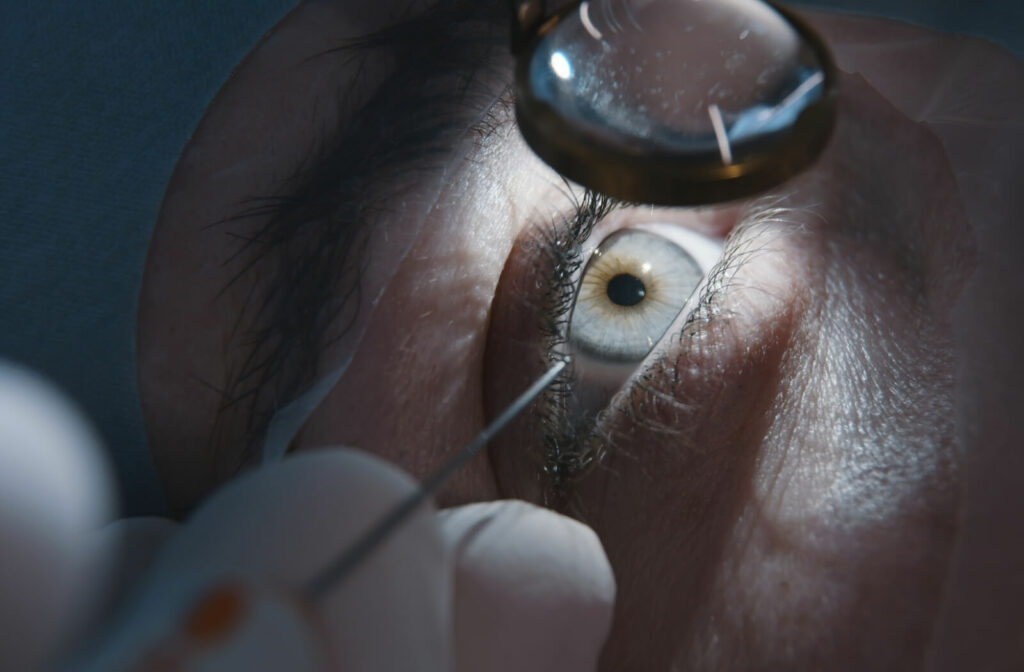Laser eye surgery, commonly known as LASIK (laser-assisted in situ keratomileusis), is a popular procedure for correcting vision problems such as myopia, hyperopia, and astigmatism. While it offers numerous benefits, it’s not suitable for everyone.
Understanding who should avoid laser eye surgery is important for safety and effective outcomes. Several factors may make someone a poor candidate for laser eye surgery, such as age, medical conditions, eye health, and lifestyle considerations.
What Is Laser Eye Surgery?
Laser eye surgery effectively corrects vision problems such as nearsightedness, farsightedness, and astigmatism, which are all due to refractive errors.
The surgery involves using a laser to reshape the cornea, the clear front surface of the eye, to improve the way the eye focuses light onto the retina.
There are several types of laser eye surgery, including PRK (photorefractive keratectomy), LASIK, LASEK (laser epithelial keratomileusis), and Epi-LASIK. Each procedure varies slightly in technique but aims to correct vision by altering the cornea’s shape.
Age Considerations
Individuals under 18 are generally not considered suitable candidates for laser eye surgery. Their eyes are still developing, and their vision can change significantly during this period. Performing surgery on eyes that are not yet stable can lead to the need for further corrective procedures later in life.
Although not an absolute contraindication, individuals over 60 should approach LASIK with caution. At this age, the likelihood of developing cataracts or other age-related eye conditions increases, which could impact the long-term success of the surgery. It’s essential to have a comprehensive eye exam to find out if LASIK would be appropriate and beneficial.
Medical Conditions
Autoimmune Diseases
Conditions such as lupus, rheumatoid arthritis, and multiple sclerosis can affect the body’s healing process. People with autoimmune diseases may experience slower healing times and a higher risk of complications, making laser eye surgery a less viable option.
Diabetes
Uncontrolled diabetes can impair the body’s ability to heal and increase the risk of infection. Diabetic patients may also experience diabetic retinopathy, which can complicate the surgery and affect its outcomes. A thorough evaluation by an eye care specialist is necessary to determine if a diabetic patient’s condition is stable enough for LASIK.
Severe Dry Eye Syndrome
Patients with severe dry eye syndrome may find that laser eye surgery exacerbates their condition. LASIK can reduce tear production and worsen symptoms, leading to discomfort and potential complications.
Eye Health
Thin or Irregular Corneas
The cornea’s thickness and regularity are crucial factors in determining LASIK candidacy. Individuals with thin or irregular corneas are at a higher risk of developing complications such as corneal ectasia, where the cornea becomes progressively thinner and weaker. Alternative procedures like PRK may be more suitable for these patients.
High Refractive Error
People with extremely high levels of myopia, hyperopia, or astigmatism may not achieve the desired results from LASIK. The surgery may not adequately correct their vision, and they might still require glasses or contact lenses post-procedure.
History of Keratoconus
Keratoconus is a progressive eye disease that causes the cornea to thin and bulge into a cone-like shape. Patients with a history of keratoconus are not good candidates for LASIK, as the surgery can further weaken the cornea and worsen the condition.

Lifestyle Considerations
Contact Sports Participants
Individuals who participate in contact sports such as boxing, wrestling, or rugby are at a higher risk of eye injuries. The flap created during LASIK can be dislodged by trauma to the eye, which can lead to serious complications. For these individuals, alternative vision correction methods like PRK, which does not involve creating a corneal flap, may be more appropriate.
Pregnancy & Nursing
Hormonal changes during pregnancy and breastfeeding can affect vision stability. Pregnant or nursing women should wait until their vision has stabilized postpartum before considering laser eye surgery. This can provide more accurate results and reduce the risk of complications.
Unrealistic Expectations
Candidates must have realistic expectations about the outcomes of laser eye surgery. While LASIK can significantly improve vision, it does not guarantee perfect 20/20 vision. Some individuals may still require glasses or contact lenses for certain activities, such as reading or driving at night.
Making an Informed Decision About Laser Eye Surgery
Laser eye surgery offers a life-changing opportunity for many, but it’s not suitable for everyone. Factors such as age, medical conditions, eye health, and lifestyle considerations play crucial roles in determining candidacy. A comprehensive eye exam and consultation with a qualified eye care professional are essential to assess whether LASIK or another eye surgery is the right choice.
At Brighton Eyecare, our experienced optometrists are dedicated to providing thorough evaluations and personalized recommendations. If you’re considering laser eye surgery, schedule an appointment with us to discuss your options.









